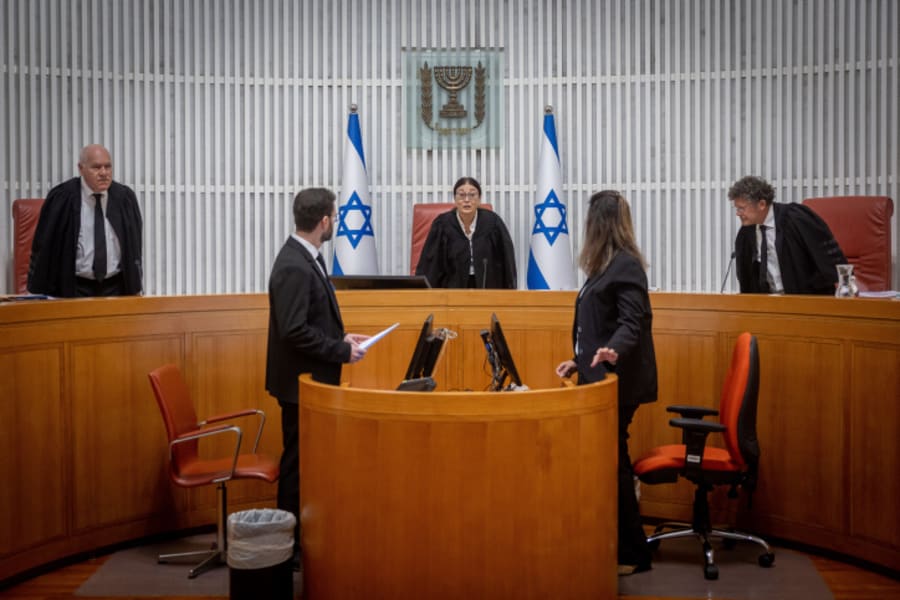Israel’s Supreme Court could lose ‘the last word’

Since the birth of the modern State of Israel, the Supreme Court – known by the Hebrew acronym “Bagatz” for “Beit Mishpat Gavo’ah LeTzedek” – has been the highest court in the land, adjudicating cases which had been challenged and awaited the ruling of the up to 15 judges who compose the judicial institution.
Now, that may change. How and why? Ever since the defeat of Prime Minister Benjamin Netanyahu in the 2021 elections, he wasted no time plotting and planning how to restore his position and get back into power.
Similar to assembling many pieces of a puzzle, Bibi was able to forge a way back with the help of veteran loyalist parties, as well as a few new political parties comprising extremist, right-wing, up-and-coming candidates, who managed to garner the support of young people, the ultra-Orthodox and religious Zionist devotees – many of whom live in Judea and Samaria, the territories beyond Israel’s green line.
Among these newcomers, whose positions are much more aligned with their supporters, though they do not make up the majority of Israel’s population, is Aryeh Deri – the chairperson of the Shas political party.
Deri was convicted of receiving $155,000 in bribes while head of Israel’s Ministry of the Interior, and even admitted to having done so. For this crime, Deri served a three-year prison term in the year 2000. Released after just 22 months, Deri, nonetheless, went on to become Minister of the Economy in 2015 and Minister of the Interior from 2016 to 2021.
Why is this significant? Because, at present, Israel’s Basic Law states that anyone who has been convicted of a crime cannot hold a public office.
The Tuesday morning vote has now enabled Aryeh Deri to continue serving, regardless of his shameful past – a calculated move which angered the opposition, which sees this new law as a clever and manipulative way to better serve the interests of the ultra-Orthodox and of others who aspire to see the world’s only Jewish homeland with a more religious and less pluralistic face.
Until now, Israel’s Supreme Court had the power to annul whatever it determined violated the principles of the Basic Laws, established in 1984, many of which deal with human rights and freedoms of all types.
Since the Tuesday ruling directly opposes the Basic Laws, there is some expectation that someone will legally challenge the overturning of the law as unconstitutional. Knowing that that possibility exists, the Likud party, which Netanyahu heads, threatened to pass a law which would override the final judgment of the Supreme Court – meaning that its authority would no longer be recognized.
This would be a major development for the only democracy in the Middle East and would turn it into a nation in the ranks of banana republics, where the political party in power seizes all authority, failing to recognize established law or governing bodies which enforced justice and moral legal conduct in the past.
It stands to reason that such an action would greatly affect the freedoms and democracy which Israel has enjoyed since her establishment as a sovereign nation in 1948 – not to mention the erosion of separation of powers. An interesting question is, why would Netanyahu support such a measure, which would change the face of Israel’s democracy in an obviously corrupt way – giving the political advantage to one party?
The answer might be found in a November article in Haaretz, titled “Allowing Knesset to Overrule Top Court Would Imperil Israel’s Democracy, Legal Experts Warn. The article states, “For some members of the likely governing coalition, passing such legislation is an ideological issue. But Likud chairman Benjamin Netanyahu will probably support it only because, unless its power is curbed, the High Court of Justice would overturn measures to stop his trial.”
And herein is the issue. A majority of 61 lawmakers would have the power to do what it wants, seizing all the power required to rule as they see fit, regardless of existing laws, effectively ending the power of the judiciary.
But while Israeli citizens, and especially minorities within the population, could find themselves easily disenfranchised from a court system which might have granted them the justice they were seeking otherwise, the one who stands the most to gain from this is the incoming prime minister.
With ultimate power in the hands of the Knesset lawmakers, who would have a monopoly over the political landscape, it’s fair to say that if Netanyahu is found guilty of any of the charges he is being tried for, the Knesset could set aside the ruling of the court, granting themselves the ultimate authority to determine the prime minister’s political survival.
Why wouldn’t they use this authority to keep their political leader in power? What would that do to the foundations of justice in the State of Israel?
The ramifications are perhaps the scariest and most troubling that have ever faced our country. Although many voices are coming forward to fight this power grab by extremists, there will need to be a non-stop grassroots campaign, by the people of Israel, to ensure that their democratic freedoms are not trampled upon, because this is just the beginning of a long-series of changes being considered by this new government.
If they have their way, the nature and character of the Jewish homeland will be dramatically changed to favor one position, one coalition and one expression of Jewish law and faith. It will effectively cut out large swaths of Jewish thought and beliefs which have always been seen as equally valid and impede upon the prerogative of people who historically have had the freedom to make up their own mind as to how they choose to live.
Israel’s Supreme Court has done its best to uphold that freedom. It needs to continue to have the last word on matters of justice, rights and human dignity.

A former Jerusalem elementary and middle-school principal who made Aliyah in 1993 and became a member of Kibbutz Reim but now lives in the center of the country with her husband. She is the author of Mistake-Proof Parenting, based on the principles from the book of Proverbs - available on Amazon.













